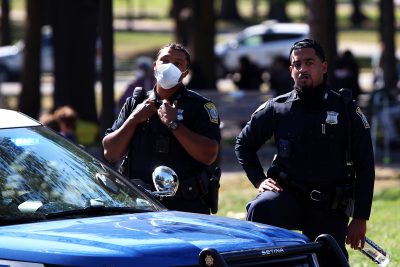The Boston Police Department lags behind in police reform because of inappropriate budget allocation, according to a report released Thursday by Lawyers for Civil Rights Boston — an organization that aims to support immigrants and people of color.

The analysis revealed that the BPD has seen a 46 percent increase in funding in the past decade.
Meanwhile, department spending on oversight and community engagement decreased while spending on traditional policing initiatives — those focused on investigation and arrest — increased, according to the report.
“BPD often puts out reports that reflect one narrative and I think that this budget report shows that that narrative is not what’s actually going on,” said Arielle Sharma, a staff attorney at LCR and lead author of the report. “This report was aimed to empower our community by giving them a peek behind the curtain of what’s really happening in their police department.”
The report follows a season of city and state level reforms. In October of last year, Mayor Marty Walsh accepted reform recommendations by the City’s recently established Police Reform Task Force, creating a Diversity and Inclusion unit within the department, expanding the use of body cameras and seeking to increase transparency and accountability.
Walsh signed a city ordinance in January creating an Office of Police Accountability and Transparency, with powers to probe allegations of police misconduct.
These reforms include a $12 million cut to the BPD’s nearly $61 million overtime budget, in the wake of the killing of George Floyd in Minneapolis. That reallocation was meant to go toward community programs for youth, homelessness and those affected by inequality.
But the LCR’s report argues these reforms are “more performative than meaningful,” citing how the Bureau of Community Engagement, Bureau of Professional Development and Bureau of Professional Standards each have total budgets under $6 million — compared to the Bureau of Field Services, which oversees traditional policing and took 60 percent of the decade’s $128 million BPD budget growth.
“There has been a lot of growth in certain aspects of the police department,” Sharma said. “When you look at BPD’s website, you’ll see that they claim to be community policing and yet the money has been going to these traditional policing tactics.”
The overall police budget constitutes more than 10 percent of the city’s overall budget, making it the second-highest spending area after Boston Public Schools, according to the report.
In the past decade, the BPD grew more than similarly populated cities studied in the report, including New York, Chicago, Seattle, Atlanta and Detroit.
That growth partly results from an award by the Joint Labor Management Committee in 2015, according to City Councilor Kenzie Bok, who chairs the Council’s Ways and Means Committee that reviews City spending.
“[The award] gave our police force a large retroactive raise that I think was really out of line with civilian pay increases in the city,” Bok said, “and that’s the main driver of the ten-year growth that the report is talking about.”
Bok said the largest part of the police budget goes to police salaries, and changing that requires negotiating contracts.
“It really brings us back to the need to negotiate the next round of contracts with an eye to equity for our civilian workforces,” Bok said, “and prioritizing all these other critical city department functions and not having them get crowded out by our public safety budget.”
Some of the numbers in the LCR analysis need to be reviewed in context, Bok said, such as the 62 percent drop in professional development training in the past year, which stemmed from a greater number of police cadets being sworn in as officers than the prior year — as is typical of the police cadet class’ scheduling.
“Again, most of the budget is personnel costs,” Bok said. “It’s not actually a reflection of fewer resources being spent on professional development.”
Deborah Ramirez, professor of law at Northeastern University, said increased training alone is insufficient.
“I’ve been doing this work for 20 years,” Ramirez said. “For 20 years, people have come up to me and said, after each police shooting, ‘Look, we’re doing training, we’re doing anti-bias training, we’re implicit bias training, we’re doing racial profiling, data collection and still the shootings occur.’”
She added that effective police reform requires more thorough systems of accountability, which include detection of poor behavior among officers and means of prevention.
“Everyone knows there are officers who have drinking problems, drug problems and anger management problems and who are trauma victims and who are acting out,” Ramirez said. “Everyone knows who they are, but no one does anything because the police chief cannot hire, fire or promote or discipline because they bargained away the chief’s managerial powers through union negotiations.”
Ramirez proposed mandatory liability insurance for police officers to hold them accountable for misconduct.
The OPAT board that launched this year will house a Civilian Review Board and Internal Affairs Oversight Panel, which Sharma said she hopes will be transparent and have real authority to fix systemic issues.
“In truth, reallocation of funds is only a first step in a cultural change that is extremely necessary,” she said. “But making those changes are an important first step in leading to change.”
The BPD could not be reached immediately for comment.


















































































































